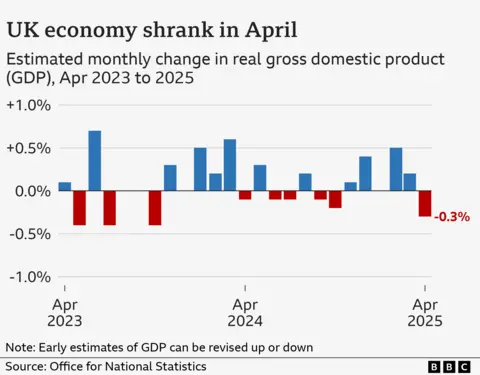Business reporter, BBC News
 Getty Images
Getty ImagesThe UK economy suffered its worst contraction in almost two years in April as taxes increased for businesses, household bills jumped and exports to the US plunged.
The economy shrank by 0.3%, more than the 0.1% fall predicted by experts – marking the steepest monthly decline since October 2023
In April, employers’ National Insurance and water, energy and council tax bills all rose, while the introduction of tariffs by President Trump led to the largest monthly fall on record in exports to the US.
The figures come a day after Chancellor Rachel Reeves set out spending plans aimed at boosting growth, with funding increases for the NHS and defence, but budgets squeezed elsewhere.
The UK government has made growing the economy its main priority in an effort to boost living standards.
In her Spending Review on Wednesday, Reeves prioritised long-term investments over day-to-day spending.
She said the latest figures on the economy were “clearly disappointing” but added she was “determined to deliver” growth.
A poor month for the services sector, which includes businesses ranging from retail and hospitality to hairdressers and finance, was behind the contraction, along with manufacturing.
Legal firms and property companies also “fared badly”, the Office for National Statistics (ONS) said, following a strong March which saw many homebuyers rushing to complete purchases to avoid stamp duty hikes.
Car manufacturing performed poorly too after the introduction of 25% tariffs on vehicles being imported to the US. Cars are the UK’s biggest export to the US, with one in eight cars built in Britain sent to the US.
“After increasing for each of the four preceding months, April saw the largest monthly fall on record in goods exports to the United States with decreases seen across most types of goods, following the recent introduction of tariffs,” said Liz McKeown, director of economic statistics at the ONS.
Monthly growth figures can be volatile and the more stable three-month figure to April showed the economy grew by 0.7%.
However, trade data also released on Thursday showed the value of UK exports decreased by some £2.7bn in April, with goods to America alone falling by £2bn.
‘Challenging’ month for businesses
Reeves told the BBC that April was a “challenging” month with businesses facing a lot of uncertainty due to the introduction of US tariffs.
However, Conservative leader Kemi Badenoch told the BBC’s Today programme that Labour “went after businesses” when it introduced the rise in National Insurance, but declined to say whether the Conservative would reverse the increase.
The rate that employers pay rose to 15% from 13.8% in April on a worker’s earnings above £175. The threshold at which employers start paying the tax was reduced from £9,100 per year to £5,000.
Firms also faced higher minimum wages and business rates.

The chancellor said that since April, the government had agreed a deal on tariffs with the US and had also made trade agreements with the European Union and India.
US President Donald Trump has imposed tariffs on many countries since returning to the White House in an attempt to encourage businesses and consumers to buy more American-made goods.
Despite the deal agreed with the US, a 10% import tax still applies to most UK goods entering America.
Tariff reductions agreed on UK car and steel exports have also not yet come into force, with officials working to finalise the deal by 9 July.



